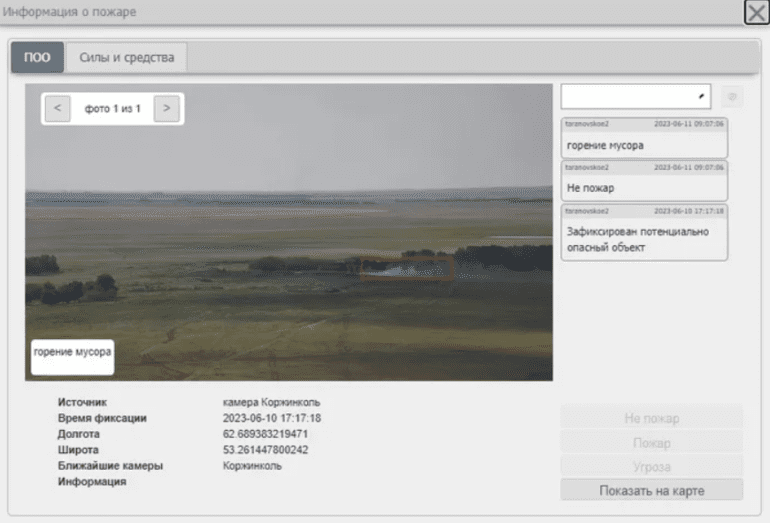TL;DR:
- Beeline Kazakhstan introduces Orman-AI, a fire detection solution, in Kostanay region
- Utilizes computer vision tech for rapid fire identification, aided by 34 cameras atop antenna masts
- The system alerts monitoring center upon fire detection, reducing response times to less than one hour
- The project aims to scale up with double the number of cameras and expand to other regions
- Beeline explores diverse applications for AI solutions, including agriculture and smart city monitoring
Main AI News:
Beeline Kazakhstan, a subsidiary of Veon, has unveiled its innovative fire detection solution, Orman-AI, in the Kostanay region. Leveraging cutting-edge computer vision technology developed in-house, this system empowers local fire guards to respond swiftly to potential wildfires.
In collaboration with the Department of Natural Resources and Environmental Management of the Akimat of the Kostanay Region, Beeline utilized thousands of images to train Orman-AI to distinguish smoke from other environmental factors, such as fog. The deployment involves installing 34 cameras atop Beeline’s antenna masts across the region, each with a remarkable range of 25 kilometers. These cameras execute a full 360-degree rotation every ten to twelve minutes, providing real-time footage to Orman-AI for meticulous frame-by-frame analysis.
Upon detecting a potential fire, the system promptly alerts the monitoring center, pinpointing the fire’s location with an error margin of just 100 meters. This advanced technology not only expedites response times but also mitigates risks by enabling further assessment through Unmanned Aerial Vehicles (UAVs), thus eliminating the necessity to dispatch workers to the site.
Forest fires pose significant challenges globally, exacerbated by climate change. In Kazakhstan alone, they inflicted damage on 103,000 hectares of land in 2022, with a tragic incident in the Abai region claiming 14 lives last year.
Enhancing Response Capabilities
According to Beeline, the implementation of Orman-AI has substantially reduced the average forest fire area from 7.3 hectares to merely 2 hectares. Moreover, response times have been slashed to less than one hour, compared to the previous norm of up to three hours. Maxim Tsvykov, Head of New Business at Beeline Kazakhstan, emphasized the paramount importance of early detection in forest fire suppression efforts, underscoring the system’s effectiveness despite the relatively low number of alerts generated.
Addressing Operational Challenges
While technological glitches have been minimal, operational challenges, such as stains on camera lenses leading to false alarms, have surfaced. Nonetheless, Beeline remains committed to overcoming such obstacles, with plans underway to double the number of deployed cameras and expand the solution to other regions. Tsvykov anticipates that scaling up the project will yield economies of scale, further enhancing its impact.
Diversifying Applications
Beyond forest fire detection, Beeline envisions broader applications for its AI-driven solutions. Tsvykov highlighted potential applications in agriculture and cited the company’s extensive experience in deploying computer vision across various sectors. Notably, Beeline has developed facial recognition solutions deployed in customer-facing applications and piloted numerous initiatives ranging from worker safety protocols to smart city monitoring.
Investing in Expertise and Innovation
Tsvykov emphasized Beeline’s commitment to enhancing employee competencies in data science and machine learning, which is crucial for the success of such projects. Furthermore, the company continues to explore opportunities to bolster its presence in the computer vision market, deliberating between developing proprietary technology or fostering partnerships with industry experts.
Pioneering AI Advancements
In addition to fire detection systems, Beeline has ventured into generative AI technology. Its Kazakh-language model, Kaz-RoBERTA-conversational (BeeBERT), developed using a Google core neural network, marks a significant milestone as the first GenAI model in Kazakh. This innovative model is already being deployed in customer care services across Beeline’s digital platforms, showcasing the company’s dedication to innovation and customer-centric solutions.
Conclusion:
Beeline Kazakhstan’s deployment of Orman-AI signifies a significant advancement in forest management and fire prevention. By leveraging cutting-edge technology and strategic partnerships, Beeline demonstrates its commitment to innovation and sustainability in addressing environmental challenges. This initiative sets a benchmark for the market, highlighting the potential of AI-driven solutions in mitigating natural disasters and fostering ecological resilience. As industries increasingly prioritize environmental stewardship, Beeline’s pioneering efforts position it as a leader in leveraging technology for societal benefit.

